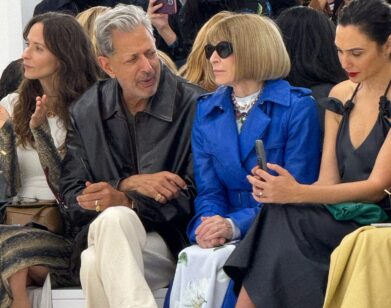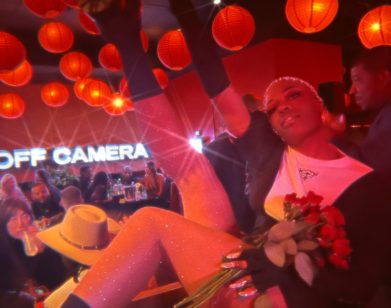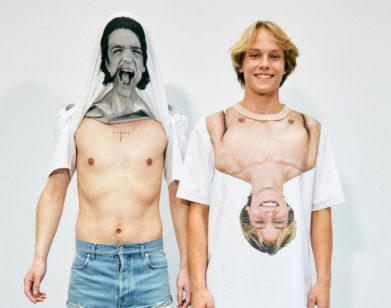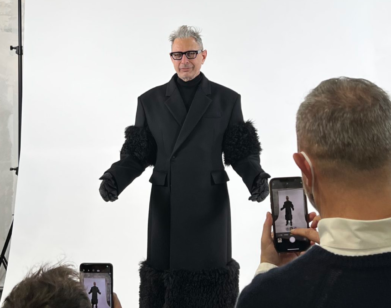Straddling Multiple Universes with Jeff Goldblum
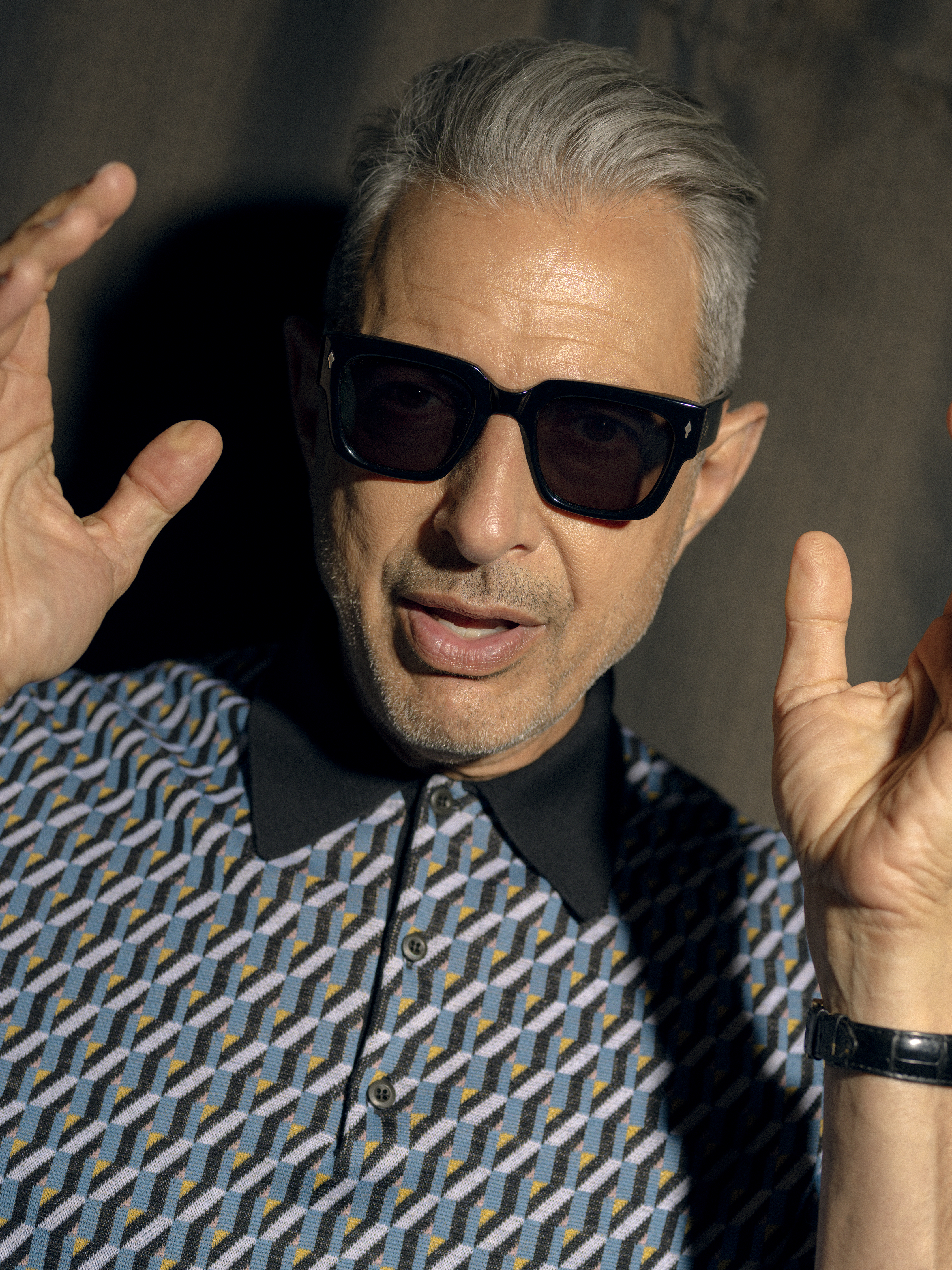
It goes without saying that Jeff Goldblum is, to put it succinctly, something else. Much ink has been spilled on the buttery consistency of his voice, the beguiling poppage of his eyes, the acrobatic contortions of his facial musculature as he dissolves an idea from the ether into his brain. At age 66, Goldblum is the least kept secret in Hollywood, among the most beloved men in the industry. And yet, sitting beside Goldblum on a velvet couch in the lobby of the Greenwich Hotel in Tribeca (better than the armchairs, he says, so we can get close), it feels as if I’m discovering that secret anew.
The oral histories and the “zaddy” memes are, for once, not hyperbole. Goldblum really does possess this “natural timbre that he can’t even control that vibrates the pelvic bone of whomever he’s making eye contact with,” as Nick Offerman once said. When Goldblum speaks, he emits flickers of shiny curiosity, expanding outward toward a great big world of great big ideas. To enter his orbit is to be reminded of all things rich with feeling; it makes sense why he has adopted jazz as his side hustle (or, more accurately, his concurrent hustle). After years of playing a weekly gig at the Rockwell in L.A.’s Los Feliz neighborhood, his band, Jeff Goldblum & The Mildred Snitzer Orchestra, have just released their sophomore album, which hit number one on Billboard’s jazz chart, with another coming in the fall. Jazz—and by extension Goldblum—is about being in the body, of being two drinks deep and strolling the streets in the post-traffic zen of midnight. His voice is the saxophone line, the winking lights across the water, that passage that you return to over and over with a newfound arrival at some essential truth. It floods the gates of curiosity and reminds you that the grandest thing in life is, perhaps, the sum of its littlest parts.
In his new film, The Mountain, directed by Rick Alverson, Goldblum plays a lobotomist in the vein of Walter Freeman, the infamous doctor who performed an ice-pick surgery on Rosemary Kennedy in 1941. The film is a haunting meditation on mental illness and the allure of stillness, of dark histories and the frayed edges of charisma. It takes place along the West Coast in the 1950s, against the backdrop of a burgeoning New Age movement, with a particularly unhinged mystic figure (played by Denis Lavant) shedding light on the more sinister side of spiritual practice. Back on the velvet couch, Goldblum takes me through his own experiments in enlightenment in the ’70s, which involved removal of a myeloma by a “psychic surgeon,” a visit from a medium who cleared his shared coffee table with Laura Dern of ghosts, and a devout yoga regime. And yet, as Goldblum reminds me, he is still a man of science. “You don’t believe in astrology, do you?” he asks me, when I bring up his sign. “It’s utter nonsense. I’ll play games all day long, and I like to act and that’s fun too, but I think it’s a good idea to keep your fingers on reality.”
———
JEFF GOLDBLUM: Did you see the movie?
NECHAMKIN: I did.
GOLDBLUM: Did you like it?
NECHAMKIN: I loved it. It was very dark and beautiful and still. There’s such a contrast between your public persona and the character you play, and yet they both possess this charm that’s taken to such a sinister extreme in the film. And then there’s the angle of the New Age-y cult figure, which is fascinating.
GOLDBLUM: I thought so, too.
NECHAMKIN: I’m curious whether there have been things in your life that you connected to that. I know you meditate.
GOLDBLUM: Well, yes. When I started acting, I got introduced to it in ’67, ’68 at Carnegie Mellon University in Pittsburgh, during summer sessions when I was in between ninth, tenth, and eleventh grade. Yoga was part of the training that I fell wildly in love with, when I decided to be an actor. Counter-cultural things were going on that I was intrigued by and identified with. And then when I moved to New York at 17, I normally went to the Neighborhood Playhouse, but I started to go to the Integral Yoga Institute and do classes there. Then I started to do Transcendental Meditation in 1973. It was the heyday of New Age-y kind of things. So I had brushes with all sorts of things. I had a psychic surgeon once. Do you know anything about that? It was from the Philippines, and was supposedly started where people called etheric bodies can do surgery, and go in and bloodlessly pull out tumors from all sorts of places.
NECHAMKIN: Wow.
GOLDBLUM: I was taken to see somebody in Glendale and he put a piece of a secret Bible on my chest. He said, “What’s wrong with you?” I said, “Nothing, I was just kind of curious.” There are people in the waiting room that were afflicted with one thing or another. I said, “I’m nearsighted, I’ve got a mild case of myopia. I don’t know why that is.” He said, “Well, you want me to be the judge of that? Want me to check you out?” I said, “Okay.” I laid down on this thing, he put a Bible on me with a piece of onion skin under it. He said, “I’m taking an X-ray,” and then he took the Bible off. And he looked at it, and he goes, “You have a blockage behind your eye, that’s why you’re nearsighted. You want me to take it out?” So I laid down, and he had an assistant there, and he said, “Close your eyes.” And then he did this [Gestures toward behind his eye].
NECHAMKIN: Oh my God.
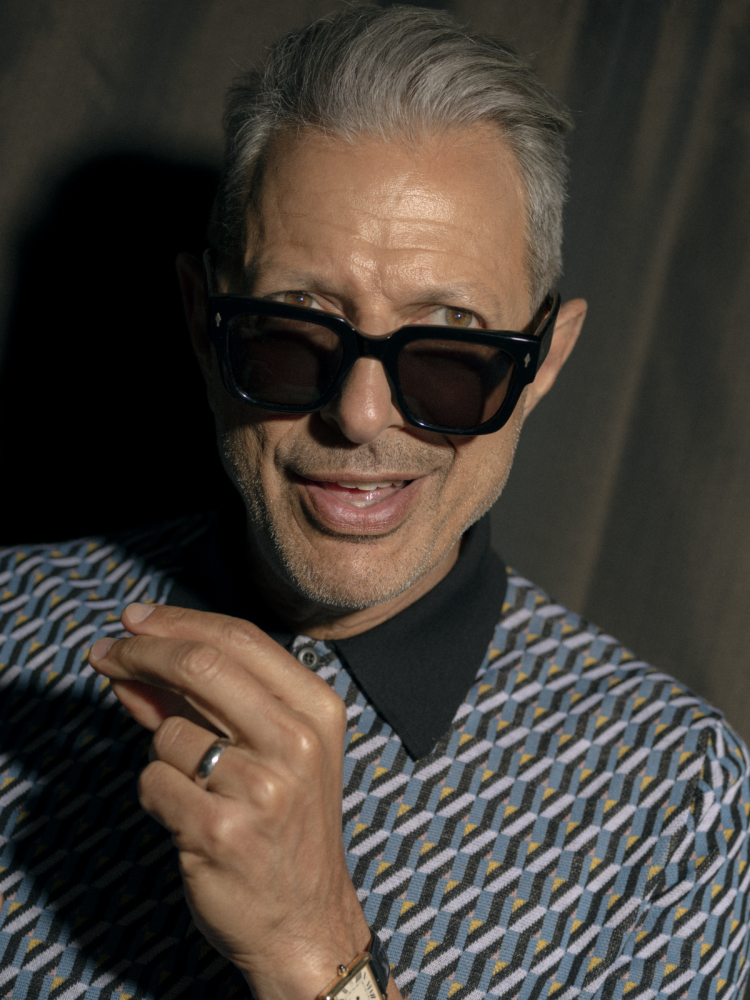
GOLDBLUM: I could feel him like, “Oh, my gosh. Is he actually behind…?” Then she was wiping up something. Am I bleeding? What the hell is going on back there? And then he said, “Okay, I got it, I got it.”
NECHAMKIN: You were conscious?
GOLDBLUM: Yeah, I was conscious. I said, “Can I see that?” He had a wash basin, and he had what I’m sure was a piece of chicken liver or something like that that he had taken with him. So I said, “Wow, that came out of there?” He said, “Well, you’ll have to come back if it’s going to work, and I’ll give it more of that kind of stuff.” And that’s when I heard he was charging people more money for that kind of thing, and I didn’t go back. Nothing ever improved, but I’m sure it was phony.
NECHAMKIN: If it did, you wouldn’t have your signature glasses.
GOLDBLUM: Exactly. He did me a big favor. Rick Alverson—he’s had a feeling about occult things, in some ways. I was trying to gather what pulse this movie was about from the start, and halfway through I found this book by Kurt Andersen, Fantasyland: How America Went Haywire, about the seeds of the American story being planted early on with people. Just like the people in that movie The Battle of Buster Scruggs, who were gold-seeking and ignorant and brutal, among other things. This movie is critical, in some way, like those P.T. Anderson movies, The Master and There Will Be Blood, which I like.
NECHAMKIN: I read somewhere that Laura Dern said there was a psychic that came and told you there was a ghost living in your coffee table?
GOLDBLUM: That’s true. We were together for four years, and we lived in this house. We had this table made, and she had this woman come, this shaman of some kind, who examined the whole house and went around and said, “Well, it’s mostly clean except there’s that table. Where’d you get that table? Something is not good with that table. Want me to clean it up?” Once again, all too willing. And she got under it, and we left her alone for a while, and she did something and pronounced it exorcized.
NECHAMKIN: Did you feel a difference after she left?
GOLDBLUM: No.
NECHAMKIN: But you still continued to do stuff like that?
GOLDBLUM: I did at that point. Even now, I still do. Acting, of course, has to do with the unseen. It’s pretending. After all this time, I’m a person of craft and magic. The universe is mysterious, and there are many things we don’t know. And I’m nothing but open. But these days, with a couple boys around, I’ve been thinking about what I want to expose them to. I like stories, but I like to tell the difference between made up stories and reality. I like the facts, and I think there’s much inspiration to be derived from that.
NECHAMKIN: I’ve been thinking a lot about how mysticism and spirituality have come back in a big way. We have Marianne Williamson running in the upcoming election. What do you think about that?
GOLDBLUM: Well, I’ve known her for a while, so I’ve met her. And some of what she said, even in that first debate that had to do with preventative measures that would not require medical crisis attention, seems sound. I’m reading these books by Yuval Harari—do you know his books? I’m devouring them. I’m on my third book right now.
NECHAMKIN: Yeah. I read half of Sapiens.
GOLDBLUM: I read all of Sapiens, and then I read Homo Deus, and now I’m on 21 Answers for the 21st Century. He’s a scientist and I like his rationality, and his high altitude, and large perspective view of history. But he also meditates two hours a day. I’m in pursuit of the best understanding of things myself. Especially given these couple of boys. I’m doing this series in the fall that Disney’s going to stream called The World According to Jeff Goldblum. It has to do with science and things that are familiar all around us, but may yield interesting perspectives.
NECHAMKIN: You’re also the voice of God [on the TV show Happy!].
GOLDBLUM: Yeah, I am, that’s right.
NECHAMKIN: Do you believe in God yourself?
GOLDBLUM: Not the traditional man-in-the-sky idea.
NECHAMKIN: What do you think it is about your voice that people gravitate towards?
GOLDBLUM: Who knows? I’m always lucky to get a part or two. On any one day, it can be a little less or more resonant. But I like making sounds. Speaking of which, we have a new album coming out in the fall, which I’m excited about.
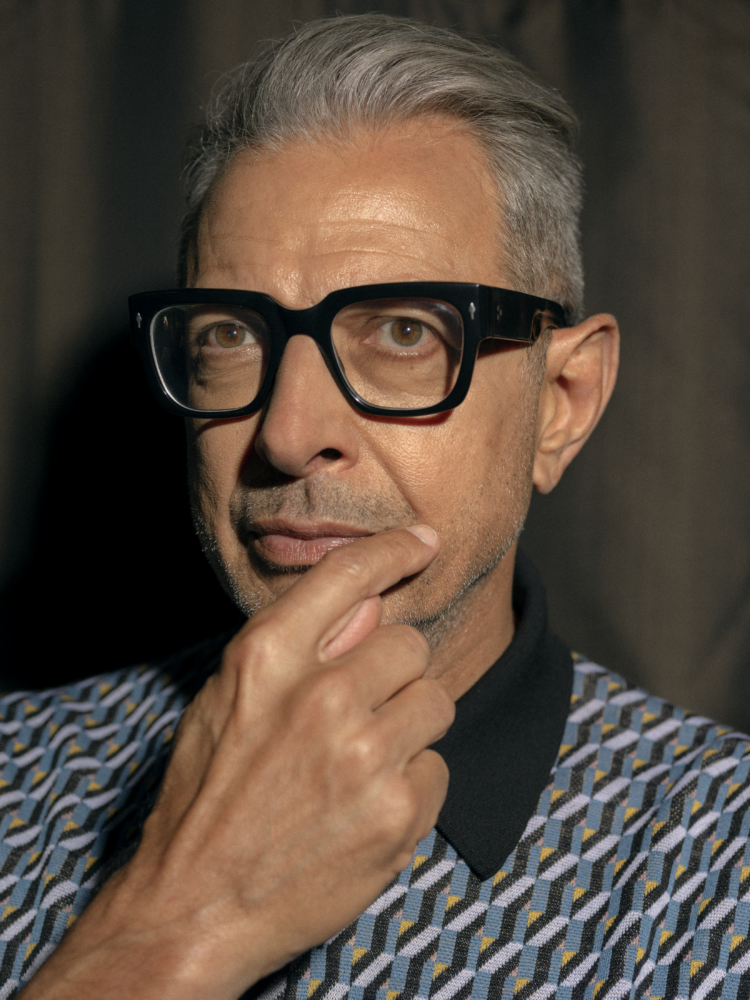
NECHAMKIN: Your birthday is in the fall, right?
GOLDBLUM: October 22nd.
NECHAMKIN: So you’re a Scorpio, Libra?
GOLDBLUM: Scorpio before Libra. You don’t believe in astrology, do you?
NECHAMKIN: A little. Do you?
GOLDBLUM: No. Not at all. Science tells us it’s nonsense. It’s fun, and I like to do things that are fun. I’ll play games all day long, and I like to act, but I think it’s a good idea to keep your fingers on reality.
NECHAMKIN: Have you ever had a strange premonition, or something of that nature?
GOLDBLUM: I have strange dreams.
NECHAMKIN: Do you ever have dreams that actually happen?
GOLDBLUM: Well, maybe. Listen to the scientists about space, and that it’s not exactly what we thought it was. You know what I mean?
NECHAMKIN: The block universe thing?
GOLDBLUM: Oh, maybe. Do you think so?
NECHAMKIN: It’s possible.
GOLDBLUM: I’m learning, but I like to dream. Last night I was dreaming like crazy. I’d have to try to remember it. Isn’t that an interesting part of the brain, that you remember, and then wonder, “Where’d that come from?”
NECHAMKIN: I don’t know if it’s that the dreams take pieces of your life and then reconstruct them in this nonsensical way, or if it’s that you remember only the parts of the dream that you can attach to reality. It’s mysterious.
GOLDBLUM: How about lucid dreaming, have you ever hear of that?
NECHAMKIN: Yeah, I’ve sort of tried it.
GOLDBLUM: You tried it?
NECHAMKIN: You have to wake up and write it down and really get conscious of it. Sometimes I’ve been able to do it a little bit, where you can be aware you’re dreaming something and then snap out of it. You’ve never?
GOLDBLUM: Maybe a little bit. “Hey, I’m dreaming, I’m going to walk down that street instead of that street.” Of course some people say even in waking life, we have no free will.
NECHAMKIN: What do you think about that?
GOLDBLUM: Well, that’s what the life sciences tell us. I know what they’re talking about. They say, “No, I go after what I want,” but what you want is not determined by you—that’s just your thoughts. It comes and goes, like your breath.

